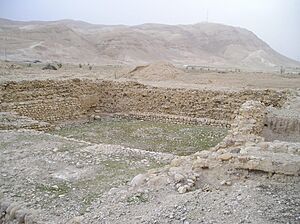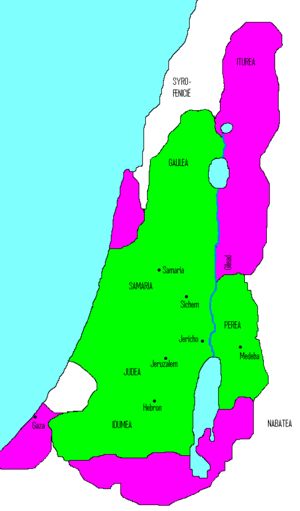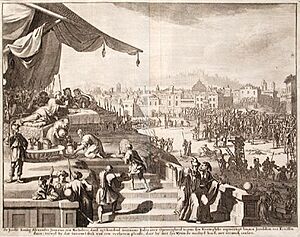Alexander Jannaeus facts for kids
Quick facts for kids Alexander Jannaeus |
|
|---|---|
| King and High Priest of Judaea | |

Alexander Jannaeus, woodcut designed by Guillaume Rouillé. From Promptuarii Iconum Insigniorum.
|
|
| King of Judaea | |
| Reign | c. 103 – 76 BCE |
| Predecessor | Aristobulus I |
| Successor | Salome Alexandra |
| High Priest of Judaea | |
| Predecessor | Aristobulus I |
| Successor | Hyrcanus II |
| Born | c. 127 BCE |
| Died | c. 76 BCE Ragaba |
| Spouse | Salome Alexandra |
| Issue | Hyrcanus II Aristobulus II |
| Dynasty | Hasmonean |
| Father | John Hyrcanus |
| Religion | Hellenistic Judaism |
Alexander Jannaeus (born Jonathan) was the second king of the Hasmonean dynasty. He ruled the growing kingdom of Judaea from 103 to 76 BCE. He was the son of John Hyrcanus. Alexander became king after his brother, Aristobulus I, died. He then married his brother's widow, Queen Salome Alexandra, following a Jewish custom. Alexander's time as king was full of battles and disagreements. He expanded his kingdom greatly but also faced many challenges, including a civil war. The main historical records about Alexander come from the writings of Josephus, especially his books Antiquities of the Jews and The Jewish War.
Alexander Jannaeus ruled the largest and strongest Jewish state known outside of biblical times. His kingdom covered most of Palestine's Mediterranean coast and areas around the Jordan River. Because of his efforts to expand the kingdom and his difficult relationships with his own people, Alexander was often involved in wars with other nations and problems within his own country.
Contents
Family and Early Life
Alexander Jannaeus was the third son of John Hyrcanus. His half-brother, Aristobulus I, became king first. To keep his power safe, Aristobulus put Alexander and his other half-brothers in prison. Aristobulus I died after ruling for only one year. After his death, his widow, Salome Alexandra, freed Alexander and his brothers from prison.
Alexander was the oldest living brother. This meant he had the right to become king. He also had the right to marry Salome, his deceased brother's widow, because Aristobulus had died without children. Even though Salome was thirteen years older, Alexander married her. This was done according to a Jewish law called levirate marriage. Alexander and Salome had two sons. The older son, Hyrcanus II, later became a high priest. The younger son, Aristobulus II, also became a high priest and later started a civil war with his brother.
Alexander was a strong supporter of a group called the Sadducees. His wife, Salome, came from a Pharisaic family. Her brother, Simeon ben Shetach, was a well-known Pharisee leader. Salome was more understanding of the Pharisees and helped protect them during Alexander's difficult rule.
Like his father, Alexander also served as a high priest. This upset some religious leaders who believed that the roles of king and high priest should not be held by the same person. This disagreement caused Alexander to turn against the Pharisees, and he treated them harshly for the rest of his life.
Wars and Expansion
Alexander's first military action was against the city of Ptolemais. While he was attacking the city, a ruler named Zoilus tried to take control of nearby coastal areas. Alexander's army quickly defeated Zoilus. Ptolemais then asked for help from Ptolemy IX Lathyros, who was a king from Cyprus. Ptolemy saw this as a chance to gain control of the Judean coast.
However, the people of Ptolemais changed their minds and did not let Ptolemy into their city. Alexander also did not want to get involved in a bigger war. So, he stopped his attack on Ptolemais and went back to Jerusalem. Alexander then made a secret deal with Ptolemy's mother, Cleopatra III. Once he had this alliance, Alexander continued his conquests. He captured the coastal cities of Dora and Straton's Tower.
When Ptolemy found out about Alexander's secret deal, he decided to attack Alexander. Ptolemy besieged Ptolemais and then chased Alexander's army. This chase caused a lot of damage in the Galilee region. Ptolemy captured Asochis on the Sabbath and took many people prisoner.
Battle of Asophon
Ptolemy and Alexander fought a major battle at Asophon, near the Jordan River. Alexander's army had many soldiers, including both Jews and non-Jewish fighters. His best fighters were pagan mercenaries who used a Greek-style phalanx formation. Ptolemy's forces crossed the river first.
At first, Alexander's army seemed to have the advantage. But then, Ptolemy's commander sent some hidden forces to attack. Alexander's army thought these were huge new reinforcements and fled. Many of Alexander's soldiers died in this battle. After this victory, Ptolemy's forces captured Ptolemais and took control of much of Alexander's kingdom.
Cleopatra III's Help
When Cleopatra III heard about her son Ptolemy's growing power in Judaea, she sent her own army. She had two Jewish generals, Ananias and Chelkias, lead her forces. Cleopatra arrived at Ptolemais and besieged the city. Ptolemy, thinking Syria was undefended, left Judaea and went back to Cyprus.
The war ended with Ptolemy leaving. Alexander then met with Cleopatra. He asked to keep his rule over Judaea. Cleopatra's advisors wanted her to take over Judaea completely. But Ananias, one of her Jewish generals, reminded her that Egyptian Jews supported her rule. This made Cleopatra change her mind. Alexander agreed to her terms and stopped his military campaigns for a while. These talks happened at Scythopolis. Cleopatra died five years later. After her death, Alexander felt free to start new campaigns.
Conquests in Transjordan and the Coast
Alexander captured Gadara and tried to take the strong fortress of Amathus in the Transjordan region, but he was defeated there. He had more success attacking cities along the coast. He captured Raphia and Anthedon. In 96 BCE, Alexander defeated the people of Gaza. This victory gave Judaea control over a key trade route for the Nabataeans to the Mediterranean Sea. Later, Alexander returned to Transjordan and destroyed Amathus, getting revenge for his earlier defeat.
Battle for Gaza
After his defeat at Amathus, Alexander focused on capturing Gaza. This was not an easy victory. Gaza's general, Apollodotus, used a clever night attack against Alexander's army. The Gazan forces, though smaller, made Alexander's army believe they were being attacked by Ptolemy. Many of Alexander's soldiers were killed, and his army fled. When morning came, Alexander realized the trick and continued his attack, but he lost more soldiers.
The people of Gaza kept fighting, hoping the Nabataean kingdom would help them. The city eventually fell because of its own leaders. Gaza was ruled by two brothers, Lysimachus and Apollodotus. Lysimachus convinced the people to give up, and Alexander entered the city peacefully. However, Alexander then turned against the people. Some desperate men killed their own wives and children to prevent them from being captured. Others burned their homes to stop soldiers from stealing their belongings. The city council and many civilians took shelter in the Temple of Apollo, where Alexander had them killed.
Judean Civil War
The Judean Civil War began around 99 BCE, after Alexander's victory at Gaza. Because of this victory, the Nabataean kingdom lost direct access to the Mediterranean Sea. Alexander also captured Gadara, which further hurt the Nabataeans' trade routes. The Nabataean king, Obodas I, attacked Alexander in a valley near Gadara. Alexander barely escaped this battle. After this defeat, Alexander returned to Jerusalem and faced strong opposition from his own Jewish people.
Feast of Tabernacles Incident
During the Jewish holiday of Sukkot, Alexander Jannaeus was serving as the High Priest at the Temple in Jerusalem. He showed his dislike for the Pharisees by not performing a water pouring ceremony correctly. Instead of pouring the water on the altar, he poured it on his feet. The crowd was shocked and showed their anger by throwing etrogim (citrons) at him. They also insulted him, saying he was not fit to be high priest. Alexander was furious and had many people killed. He also had wooden barriers built around the altar and the temple to keep people away from him. Only priests were allowed inside. This incident during the Feast of Tabernacles was a major reason for the start of the Judean Civil War.
War with Demetrius III
After Alexander had some early success in the civil war, the rebels asked for help from Demetrius III Eucaerus, a Seleucid king. Jewish rebels joined forces with Demetrius to fight Alexander. Alexander had an army of mercenaries and Jewish soldiers. Demetrius had a much larger army. Both sides tried to convince the other to give up, but neither succeeded. Demetrius's forces defeated Alexander at Shechem, and all of Alexander's mercenaries were killed.
This defeat forced Alexander to hide in the mountains. However, some of the Jewish rebels felt sympathy for Alexander and returned to his side. When Demetrius heard this, he withdrew his forces. The war between Alexander and the remaining rebels continued until Alexander won. Most of the rebels died in battle, and the rest fled until they were defeated.
Alexander brought the surviving rebels back to Jerusalem. There, he had many Jews, mostly Pharisees, put to death by crucifixion. Before they died, Alexander had the rebels' wives and children killed in front of them. Alexander later returned land he had taken from the Nabataeans in Moab and Galaaditis. He did this so the Nabataeans would stop supporting the Jewish rebels. The remaining rebels, about eight thousand of them, fled during the night, fearing Alexander. After this, all rebel fighting stopped, and Alexander's rule continued peacefully.
Final Campaigns
From 83 to 80 BCE, Alexander continued his military campaigns in the east. The Nabataean king Aretas III managed to defeat Alexander in one battle. However, Alexander continued to expand the Hasmonean kingdom into Transjordan. He captured cities like Golan, Seleucia, and Gamala in Gaulanitis. In Galaaditis, he captured Pella, Dium, and Gerasa. Alexander had Pella destroyed because its people refused to adopt Jewish customs.
It is also believed that he expanded and strengthened the Hasmonean palace near Jericho.
Death

For the last three years of his life, Alexander Jannaeus suffered from a type of malaria.
After ruling for 27 years, he died around 76 BCE, at the age of forty-nine. He died during the siege of Ragaba.
According to the historian Josephus, Alexander became very ill on the battlefield at Ragaba. His wife, Salome Alexandra, was with him. Alexander told her to keep his death a secret until she captured Ragaba. He also told her to share power with the Pharisees after his death.
Alexander's reign ended with an important decision: he named his wife as his successor. He also gave her the power to choose the next high priest.
Images for kids
-
Swimming pool at the Hasmonean palace near Jericho, believed to have been built by Alexander
 | Bessie Coleman |
 | Spann Watson |
 | Jill E. Brown |
 | Sherman W. White |







